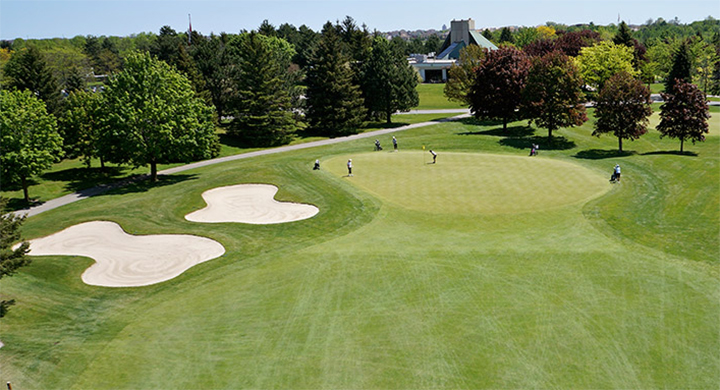Markham, Ont.’s York Downs Golf and Country Club has an offer of $412-million for its property, making it another example of a club that has found its property value outweighs its benefits as a golf course.

York Downs, a private club north of Toronto, had an initial offer of less than $325-million earlier this year to sell its prime real estate to a developer. The club elected to put out a tender to see if the land would receive other offers.
At a meeting this week, the club’s board of directors told members of a $412-million offer from a developer, which means the club would stay in its current location for five years with each member receiving about $200,000 for their share. Some members have suggested the club should relocate and build a new golf course, but according to sources that notion doesn’t seem to be gaining traction.
Before it was closed to new members, golfers who joined York Downs paid around $30,000, meaning they’ll see a significant windfall from the sale.
York Downs would be the latest golf club in Canada to recognize its land has tremendous value and the sport has an excess of courses. Corporate golf giant Clublink Corp., which is majority owned by real estate baron Rai Sahi, announced recently it will close its Highland Gate club in Aurora, with the company saying it will look at options for the valuable 100 acres between Yonge St. and Bathurst St. in the Toronto suburb.
Several courses in the Oakville, Ont. region west of Toronto have been sold for development, and Calgary’s Harvest Hills was recently sold to a developer. In the instance of Harvest Hills and Highland Gate, nearby homeowners, who purchased property that backed on the courses in question, have complained about the sales. Property owners with homes backing onto courses usually receive a premium for their houses.
But it is York Downs, with its huge sale price, that has captured much of the attention. Located in Markham, the 27-hole course would be turned into residential and commercial real estate if members vote to go forward with the deal next year. The current proposal would see the club remain in its current location for five years, and disbanded in 2020.
One member, who asked to remain anonymous, said he expects the deal will be approved by the club’s members.
“The horse is out of the barn,” the member said. “I don’t know how the club would exist if we turned this down. It is simply too much money to ignore.”
Club directors said there’s still a possibility that York Downs could purchase another property and rebuild its club there, but that appears to have little support, the member said.
“That’s not off the table, but it seems unlikely,” the member said. “There’s a real sense of relief now that there’s a concrete offer and members have a sense of how much they’ll get out of it.”
There’s a lot of controversy swirling around York Downs, as Leonardo De La Fuente, the club’s former GM was recently charged by police with defrauding the club of more than $600,000. The club is suing De La Fuente and the police filed charges last week.
However, the sale of York Downs doesn’t mean many of Ontario’s historic golf clubs will be meeting with real estate agents any time soon. Most older clubs have a deferred property tax arrangement that was created more than 50 years ago in an attempt to keep green space from being developed.
These taxes would have to be repaid if they were sold, meaning noted clubs like Rosedale and St. George’s in Toronto, and others, like Westmount in Kitchener, Ont., would not be nearly as valuable despite their prominent locations.
York Downs relocated from its previous site in Toronto in the early 1970s, meaning it didn’t have the same tax issue as other courses.




Comments